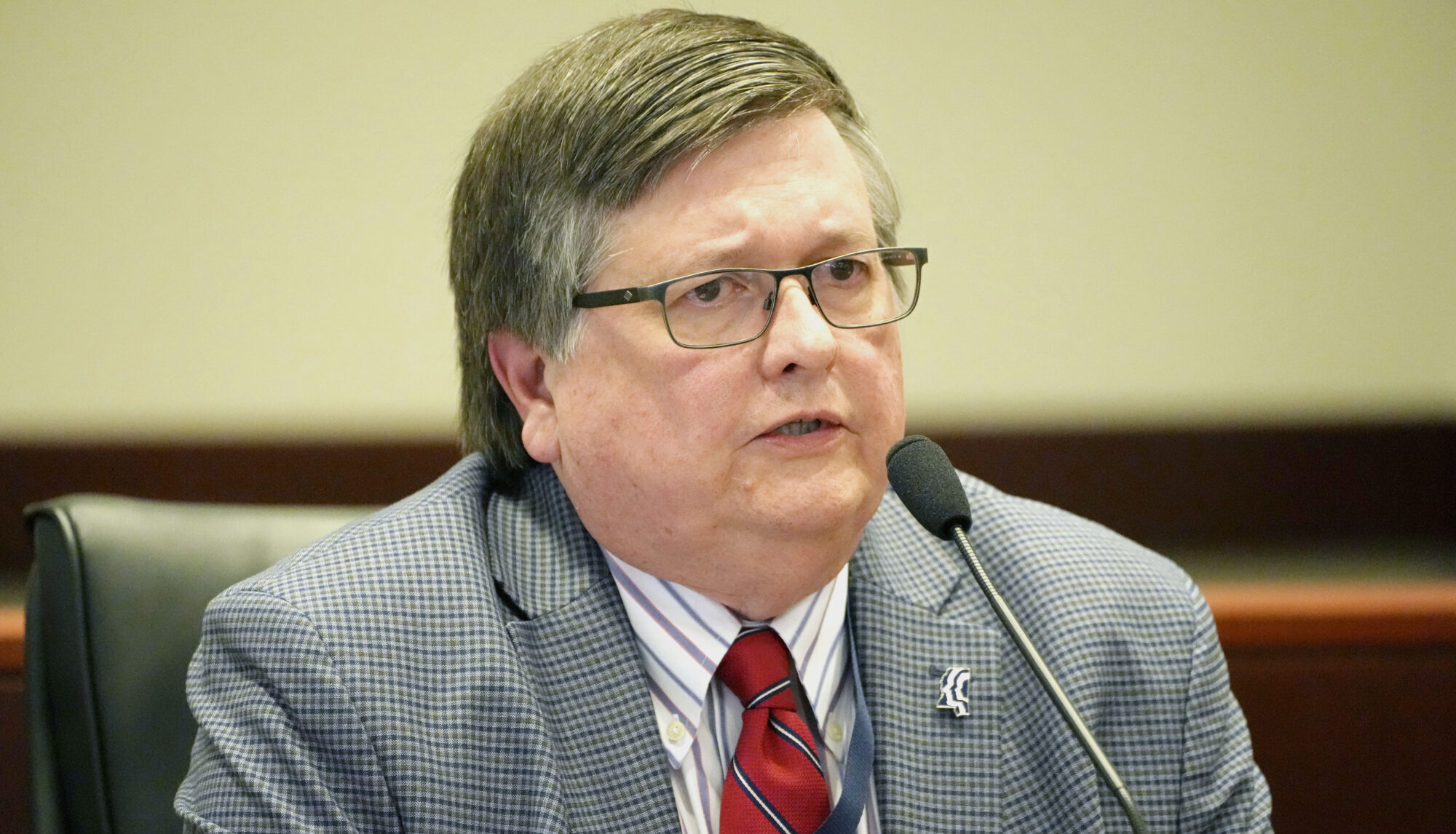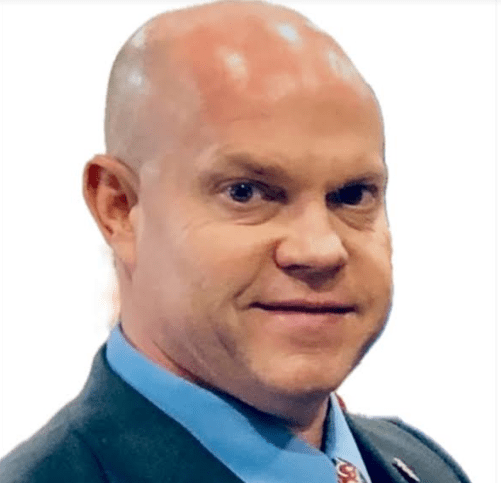
Mississippi State Health Officer Dr. Daniel Edney, addresses members of the Mississippi Joint Legislative Budget Committee during his budget presentation for the state Department of Health, Friday, Sept. 29, 2023, in Jackson, Miss. (AP Photo/Rogelio V. Solis)
State Health Officer Dr. Daniel Edney told lawmakers Wednesday that while still ranking low nationally, health outcomes and hospitals are showing signs of improvement in the Magnolia State.
Dr. Daniel Edney, State Health Officer for the Mississippi State Department of Health, offered a comprehensive public health perspective on the Magnolia State to members of the state Senate Public Health and Welfare Committee on Wednesday.
Heading into 2024, Dr. Edney said Mississippi health outcomes have roughly stayed the same, leaving the state in last place nationally.
“We aren’t just 50th in the nation. What really concerned me is how we just fall off the cliff on the graph at the end,” said Dr. Edney in reference to the graph below.

According to the state’s 2023 Public Health Report card, Mississippi continues to struggle compared to other states in terms of health outcomes but there are signs of improvement, including in maternal-fetal deaths. Dr. Edney said while one data point does not a trend make, he does hope it is an indicator of how changes in care are positively impacting mothers and babies.
State Senator Kevin Blackwell, Chairman of the Senate Medicaid Committee, said his committee will consider presumptive eligibility for low-income women likely to be eligible for Medicaid who are pregnant and seeking medical services. This would allow providers to offer prenatal care and be reimbursed by Medicaid.
Presumptive eligibility is done in 25 other states. Dr. Edney said in Mississippi many women are already showing up in their 5th or 6th month who have likely not received any preventative care.
From the Scorecard
Edney shared the following data on the Magnolia State’s health standings:
- Mississippi ranked as 50th in the U.S. for overall infant mortality
- Heart Disease is the #1 killer for Mississippi residents
- Mississippi is 48th for Diabetes and 45th for Obesity
- Mississippi dropped 10% for opioid deaths
- Mississippi ranks highest in the nation for vaccination
- COVID deaths in Mississippi are significantly lower
- Mississippi is 4th among all states and D.C. for smoking
- Accidents in Mississippi are trending up while Obesity, HIV, and Tuberculosis rates trend down.
COVID once dominated MSDH’s attention. Now, it is off their radar, according to the State Health Officer.
“So grateful that COVID is off our radar. The number of deaths are not zero but they are very low and mostly in the older and sicker populations,” said Dr. Edney. “That does not have to be a priority for the health department at this point.”
While obesity remains a large-scale chronic condition for many Mississippians, Dr. Edney said he is proud of the movement the state has made. Previously, Mississippi was ranked at 50th for obesity rates, and moved up five places to 45th over the last year. He said staff reports indicate it is likely even better than that.
Edney said even during the pandemic obesity rates dropped, which will ultimately have positive impacts on cardiovascular outcomes. He complimented the Division of Medicaid and their recent efforts to approve obesity management medications for recipients which he says will be very helpful when taking care of the Medicaid population.
Currently, cardiovascular deaths account for 9,000 Mississippians per year, many of which Dr. Edney says are preventable. The state maintains the highest rate of preventable deaths.
The second leading cause of death was reported as malignancies or cancer.
“A lot of those are preventable because we have too large a segment of our population that just don’t have access to proper screening. They don’t have access to preventative services. That fact drives cardiovascular and malignancy deaths,” said Dr. Edney.
Diabetes rates have continued to improve in Mississippi, moving up to 48th in the nation in 2023.
Dr. Edney said after looking at the cost of negative health outcomes compared to preventative care, he commissioned a study outside of the agency to determine the impact the top three causes of death have to the state’s economy. This study is not only looking at cost of care, but loss of work and productivity in the workforce.
“As we improve health, I truly believe we will improve poverty,” said Dr. Edney. “We’ve done it for education. I truly believe we can do it for health.”
Moving Health Outcomes Forward
Dr. Edney shared some solutions officials with MSDH believe will help Mississippi health outcomes improve. Those policy solutions center primarily on improving access for residents to care.
“For the population to get healthier, we have to improve access however we choose to do it and that is up to y’all’s decisions to decide how to do it,” said Dr. Edney. “For us, improving access means using our county health departments to the fullest extent that we can.”
In light of that, MSDH developed a “Know your Numbers” program. This allows anyone anywhere in the state to go into their county health department and receive a free blood pressure and blood sugar testing. In the event that screening shows abnormal results, the patient would then be provided assistance to get the care they need.
So far, Edney said 3,000 people have been screened through this new program. He then shared a story about a coincidental screening which showed hypertension in one teenager and unrecognized diabetes in another.
“We were able to identify those two and get them into a proper medical home and have those issues tended to,” said Edney.
The State’s Health Officer said another important aspect of what MSDH will be doing going forward is ensuring that communities and physicians are aware of the free resources they offer like mammograms and Pap smear screenings for uninsured individuals. He said these local health departments must be part of the fabric of their communities in order to accomplish this goal.
Edney added that MSDH plans to more frequently utilize mobile units for community efforts. He said these units will give patients greater access to care particularly during emergencies statewide.
MSDH also offers a Transportation to Health program, which provides rides to Mississippians in need of visiting their local health department for care, the pharmacy and then home. This is done through federal grant funding. While the program is new, Edney said in the last two months roughly 133 rides were given.
“Outside of poverty, probably the number one deterrent we struggle with is transportation difficulties,” said Dr. Edney.
Healthcare Systems Update
As for the health of the healthcare system, Edney sees signs of improvement.
“We’ve got some good news and some challenging news, which I’m sure is no surprise,” said Dr. Edney. “The health of hospitals is better than it was a year ago.”
He indicated that while hospital health was improving, there was still work to do, particularly for rural healthcare access that remains challenging. Edney said the overall negative financial impact from the COVID pandemic was roughly $700 million among all of the state’s hospitals. With the sustainability grant, that number will drop by roughly $55 million.
Dr. Edney believes the enhanced MHAP funding will be largely impactful. While he did not have the final numbers, he thought it would close the gap to a large degree. Out 103 hospitals, Edney said 10 were still not deemed eligible to receive grant funding.
“These are hospitals that do need help that we were not able to help through the sustainability grant,” said Dr. Edney.
A new problem on the horizon, particularly for rural hospitals, is Medicare Advantage. Edney said their reimbursement rates are much lower than traditional Medicare, the prior authorization approval process is much more stringent, and length of care is impacted.
Hospitals have alerted MSDH that these issues have impacted their margins more and more as patients move to those programs because the programs are less expensive.
Since the pandemic, doctors and nurses entering the workforce in Mississippi has improved. Edney said this comes from community-based residency programs because data indicates where doctors train is typically where they will practice.
Moving into the 2024 legislative session MSDH is asking lawmakers to take a closer look at emergency or EMS services. Edney said the services are in a fragile state due to a low workforce and reimbursements.
“We need to raise the spending cap on the trauma fund. It probably needs some attention soon so it doesn’t become depleted. We are okay right now,” said Dr. Edney.










